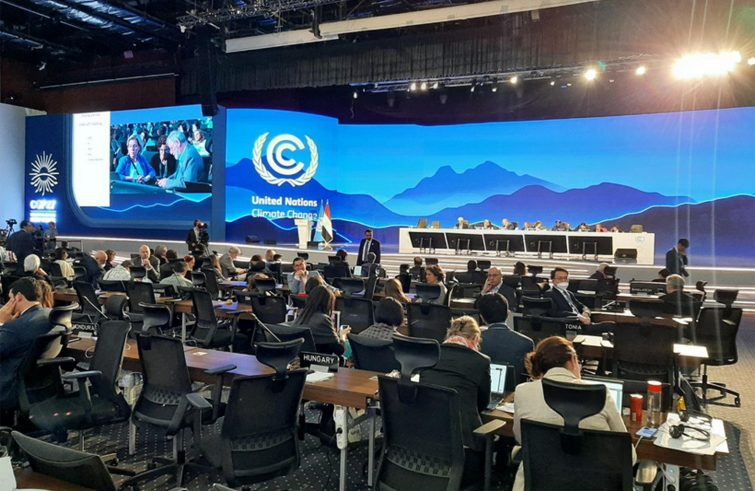
The 27th Conference of the Parties to the United Nations Framework Convention on Climate Change ( COP27) that took place in Sharm el-Sheikh, has come to an end. The final declaration preserves the goal of limiting global warming to 1.5°C above pre-industrial levels, the greatest achievement of Cop26 in Glasgow last year. However, commitments for a seriously meaningful reduction in carbon dioxide emissions were postponed. SIR asked Giuseppe Milano, Greenaccord Secretary General, to provide an analysis of the Conference at its conclusion.
 What is the outcome of Cop27: more lights or more shadows?
What is the outcome of Cop27: more lights or more shadows?
Although the Conference is in its 27th edition, it was only after the 2015 Cop21 in Paris that actual import of these international summits was understood and that, due to the enormous complexity of these processes, it would be wrong to reduce them to a matter of failure or success. In fact they are mosaics whose each additional tile is important.
However, it is worrying to note that these tentative steps forward are being adversely affected by the acceleration of climate change, with increasingly intense and frequent extreme events.
Partly because of the international geopolitical crisis, COP27 could not have achieved anything different or any more ambitious than what it did – the creation of a Loss and Damage Fund – especially considering that developing countries are the innocent victims of the Western economic model, which causes poverty and inequalities on the one side, and increasingly impactful greenhouse gas emissions on the other.
Who were the main protagonists of this COP27?
The absolute protagonists of the Conference of the Parties hosted by Egypt were the developing countries that were granted the aforementioned Fund – whose size and contributors will be defined by next year – and, above all, the fossil fuel lobbies that are allowed to continue poisoning the planet for another 12 months at least.
Mitigation and adaptation policies are not making any significant progress, with just 33 countries out of 200 having increased their emissions reduction targets. Likewise, the annual target of US$100 billion for the crucial decarbonisation goal is not being met; similarly, multilateral development banks reform has been postponed.
Hence, “supporting actors” include the United States and the European Union, which failed to show effective leadership towards achieving the results awaited by civil society and by the many international non-governmental organisations attending.
In this context, to what extent is the decision to establish a loss-and-damage fund, a financial facility to address climate-related damage and losses in the most vulnerable developing countries, an important achievement?
China’s neo-colonialism of Africa, as documented with mounting concern by numerous land-grabbing investigations, highlights the potential role that the African Continent could play with regard to global decarbonisation and the dissemination of renewables, the enhancement of rare materials, and the protection of frequently violated human rights, with the concrete possibility of combining social and environmental justice. The mention of
this Fund, while waiting to understand how it will be managed and the resources it will be granted, is nevertheless a historic achievement
because the G77 countries, united at last, are imposing their voices, thereby ensuring that the claim to compensation for the adverse effects of the climate crisis of the past few years, for which they bear little responsibility, is given political dignity.
In contrast, no progress has been made on mitigation. Was there a failure to give a clear signal on the reduction of greenhouse gas emissions?
So far, the West has distinguished itself for its announcements rather than serious action.
Talking about a Green New Deal, at EU level, is not enough if a directive to protect a non-renewable natural resource like soil, on whose health and integrity carbon dioxide storage capacity may depend, is not yet approved. The WMO and UNEP reports, released just a few hours before the opening of COP27, in fact confirm that climate-changing emissions in the atmosphere are on the rise and that there is a serious risk that the safety threshold represented by the 1.5°C increase in the average global temperature by the end of the century could be exceeded within the next decade, with the world on fast track to “climate disasters ” – in the words of UN Secretary General Antonio Guterres.
Renewable energy sources are mentioned for the first time in the final declaration of a Conference of the Parties: can it be considered a good result already? Or are these only tentative steps, as they stand alongside ‘low-emission energies’?
It is certainly a positive result, since our only hope of leaving a better planet to the next generations resides in renewables and their combination of huge floating power plants, concentrated in some areas only, and a reticulated network of scattered micro-plants.
The reference to “low-emission energy” is an invitation to use gas as a means of supporting a less traumatic transition and finally abandoning coal, which has a much greater environmental impact. Yet this mediation, while understandable, risks delaying the 2030 sustainable development goals and, more generally, investments, for example in storage systems or supply networks, which are a matter of utmost urgency.
UN Secretary General Antonio Guterres offered the following analysis: ‘Our planet is still in the emergency room. We need to drastically reduce emissions now – and this is an issue this COP did not address. Cop27 concluded with “much homework” still to be done and little time in which to do it.” This is a worrying analysis, but is it realistic?
Guterres’ concerns are absolutely legitimate, but the UN has already decided that the next COP28, eight years after the Paris Conference and nearly the same years away from 2030, should be held in Dubai. Hardly a country that, like Egypt, could be hailed as having delivered on the ecological dimension of decarbonisation.
Thus, it is hoped that the forthcoming Cop15 on Biodiversity, scheduled to take place in Montreal in a couple of weeks, will yield major results that will give new impetus to the challenge of mitigating or adapting to climate change – to which the preservation of biodiversity contributes in any case – and that Brazil’s new president, Lula, will encourage his G20 counterparts to make a serious pledge against all forms of greenwashing for the preservation of our one and only ”common home”.












